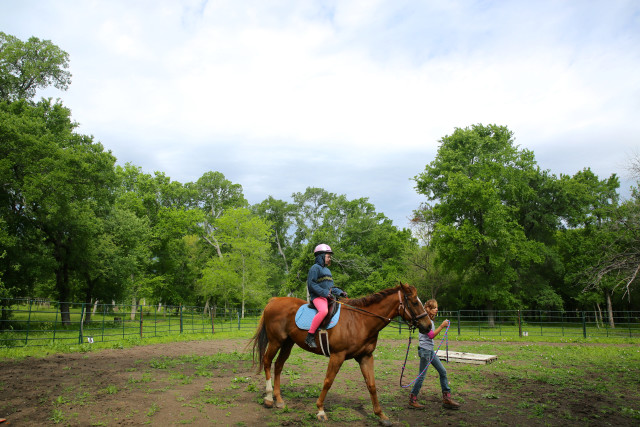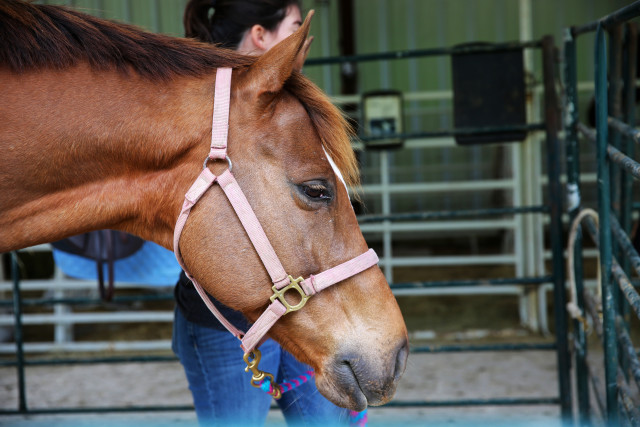Healing on the Back of a Horse
By Qiling Wang
Reporting Texas

Jozlynn Stevens (left), 11, starts her therapeutic riding session at the Healing with Horses Ranch in Manor, Texas, accompanied by her riding instructor on a Friday morning. Stevens has been working with therapy horses for three years. Qiling Wang/Reporting Texas
On a rain-soaked Friday morning after a storm Ashley Stevens held her 1-year-old son, Noah, tightly against her chest as she proudly watched her daughter Jozlynn, 11, maneuver a Chestnut name Avalon around the muddy track.
Born with Chiari Malformation Type 1, a neurological disorder that affects balance and whose symptoms cause stress, Jozlynn Stevens has been working with therapy horses at the Healing with Horses Ranch in Manor for the past three years.
“To most people, they would say ‘Oh, what’s so special about that?’ ” said Ashley, 30, as she observed Jozlynn’s progress. “To me, she’s confident and she’s building a special relationship with the horse.”
Patty D’Andrea, the ranch’s founder and executive director, agrees.
“She was really quiet when she first came here but now she’s more outgoing and confident,” D’Andrea said of Jozlynn.
Jozlynn’s program centers on therapeutic riding, part of Equine-Assisted Activities and Therapy, a growing movement that uses horses to promote physical, emotional and cognitive growth.
The list price for the standard 90-minute ride at Healing with Horses Ranch is $100, although D’Andrea said that thanks to a scholarship fund, “nobody pays the full price.” Families with financial need pay only 20 percent of the fee.
Designed to complement traditional forms of therapy, Equine-Assisted Activities and Therapy has, its adherents say, become an increasingly popular adjunct for a variety of diagnoses, among them depression, autism, post-traumatic stress disorder and Down Syndrome.
Between 2005 and 2014, the number of affiliated therapy centers in the U.S. grew some 25 percent to 866, according to the Professional Association of Therapeutic Horsemanship International, an industry group. Texas has 303 riding instructors registered with the organization, ranking second after California.
There are 12 horse therapy venues in the Greater Austin area, according to the Texas Horseman’s Directory.
“Horses are good at responding to people’s energy and emotions… ,” said Laurie Baldwin, a Houston-based psychologist. “When people are having difficulty coping with their emotions, horses can help people learn how to do that.”
For all that, the mainstream medical establishment questions the efficacy of equine-assisted treatment for mental health issues due to a lack of systematic scientific research. And most insurance plans do not cover such treatment for any kind of health problems.
“There is evidence showing that people are in a better mood afterwards but there are no well-designed studies with randomized clinical trials showing it actually works for mental illness,” said Michael Anestis, professor of psychology at the University of Southern Mississippi, who wrote a systematic review of equine-related treatment in 2014.
“It’s unethical to be offering this treatment unless they are explaining to the patients that it’s a purely experimental treatment and there are other treatments that support your illness,” Anestis said.
Scientific support for horse therapy appears to be on firmer ground when it comes to physical therapy. According to research conducted by Yonsei University College of Medicine in Seoul, South Korea, in 2014, the “warmth and shape of the horse and rhythmic, three-dimensional movement of horseback riding” is beneficial for improving the “gross motor function” of children with cerebral palsy.
“The horse’s gait is similar to human’s walking,” said Cher Smith, the Denver-based communications coordinator for the Professional Association of Therapeutic Horsemanship International. “For people who have trouble in walking or with balance, being on a horse can stimulate them and help them with flexibility. ”

Avalon, a 15-year-old Chestnut, became Jozlynn’s therapy horse after Weston died recently. Qiling Wang/Reporting Texas
Matthew Fox, 24, a client at Healing with Horses Ranch, used to walk like a “drunk man,” his mother Melissa Fox said. His challenge is low muscle tone caused by Down syndrome. After regular riding sessions, however, Fox can now “carry himself” and ride independently at a trot speed, said his mother.
A lifelong lover of horses, D’Andrea, who holds a bachelor’s degree in animal science from the University of Maryland, received advanced instructor certification from the Professional Association of Therapeutic Horsemanship International in 2008 after she completed 120 hours of instruction and passed a two-day exam.
Since D’Andrea established Healing with Horses Ranch in 2011, the ranch has offered therapy services to more than 100 clients. The facility employs three full-time therapeutic riding instructors and D’Andrea says she is currently mentoring eight more instructors and plans to build a covered arena for rainy days.
“We really researched the area in order to help as many [people] as possible,” she said. “There were a lot of therapeutic riding centers in Austin areas, but there was not whole a lot in East Austin where lower-income families live.”
“Horses are attracted to honesty,” D’Andrea said.” I encourage people to feel however they feel because the horses do not mind if you are sad, angry, or frustrated. As long as you act naturally from the outside, then they are attracted to you. They allow you to feel what you feel.”